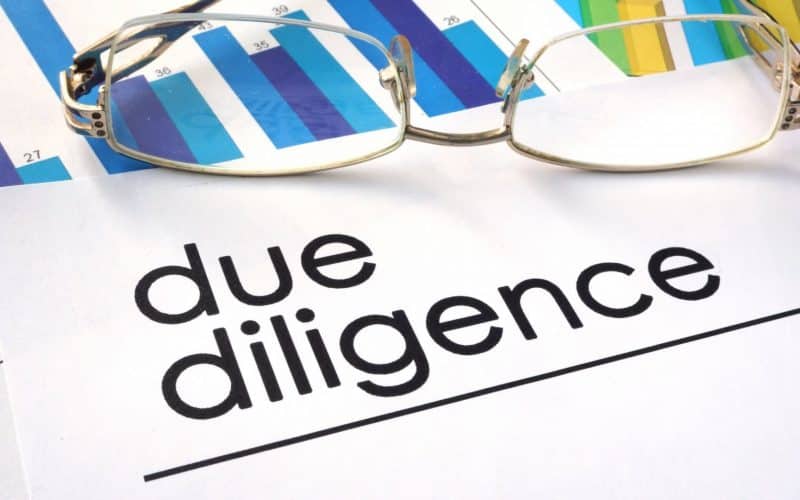At some point in your journey around the world of business, you may or may not have stumbled on the term, “Due Diligence.” If you haven’t, then this post is timely as it will unravel every aspect of the term you should know. However, if you have, then you’d agree with me that there’s a huge difference between stumbling on some vague term in business and actually knowing it. Either way, you can’t successfully run a business with just a vague idea of the term “due diligence”. You need to cover every aspect, starting with the fundamentals. Basically, this starts with the meaning of due diligence and then goes deeper into its types, examples, processes and so on.
However, for the purpose of easy assimilation, we will focus on just two aspects of the term. These would be the types and examples of due diligence; with, of course, the meaning of due diligence.
Due Diligence Meaning
In simple terms, due diligence is the systematic review of a company prior to an event. Examples of such events could be mergers or acquisitions, capital raises, initial public offerings (IPO), or audits. Furthermore, it is the investigative process that takes place prior to a financial transaction. Oten times, the aim is to determine commercial and legal risks and opportunities.
Due diligence before purchasing entails a thorough examination of a company’s vital documents and records in all areas of its operations. You must always go through this prior to the signing of a binding agreement between the parties to ensure that all uncertainties have been disclosed and all opportunities have been considered before the M&A transaction continues.
With the meaning and importance of due diligence in place, let’s move into the next phase. This talks about the several types of due diligence.
Types of Due Diligence
Let’s pump the brakes here. Before we go any further, you may want to find out for sure if you should be really be reading this. And how do you go about that? Well, this part’s really simple. Just find out who exactly is involved in the due diligence process.
For the most part some of them include;
- Companies looking to buy other businesses
- PE or VC investors looking for prospects
- Fund managers,
- Money managers, lawyers, and
- Financial analysts and advisors
Moving on, the following are some types of due diligence. However, since the process varies by sector and event or transaction form, this is not an exhaustive list. In any case, it is a reasonable starting point for understanding the depth of evaluation in play.
#1. Financial DD
One of the most significant types is financial due diligence. It aims to verify a company’s financials by conducting an in-depth review of its financials. This includes financial statements, balance sheets, sales forecasts, capital structure, debt, and other documents. Also, a financial audit also necessitates the use of financial DD.
The goal, however, is to determine the company’s past and present financial results as well as future profit margins. It will also determine if the revenue projections are fair.
Accountants or a financial consulting team will typically do this job.
#2. Legal DD
This type of due diligence is also pretty important. Reason being that it investigates any legal problems or threats that the acquirer should be aware of. Basically, anything that could pose a threat to the transaction now or in the future.
Legal due diligence plays a significant role in contract negotiations and in determining an appropriate value on which all parties can consent. In the same vein, Lawyers who perform legal due diligence play important roles on both buy-side and sell-side deal teams.
Some of the documents that undergo scrutiny in this type of due diligence include the following;
- All content contracts and agreements, including joint venture or alliance agreements,
- License agreements, and
- Loan agreements
This procedure is to ensure that the purchase will not cause any potential legal issues.
#3. Tax DD
Tax due diligence is a detailed examination of all the various forms of taxes that may be levied on a corporation, as well as the tax laws that the business may be subject to in a specific jurisdiction. It addresses all tax-related concerns and documents, including income taxes, property taxes, payroll and job taxes, sales taxes, and more.
#4. Operational DD
Operational due diligence helps to gain a thorough understanding of a target company’s functional activities. It involves a summary of the target’s business strategy and operating infrastructure, as well as an examination of opportunities to add value by enhancing the operational function.
This form is especially important in the manufacturing sector, where supply chain and manufacturing operations are crucial. Oftentimes, a third-party consultant or professional services company oversees these procedures.
#5. Intellectual Property DD
The examination of a target company’s intangible assets, such as patents, copyrights, trademarks, and brand names, is known as intellectual property due diligence. Although intellectual property is difficult to measure in monetary terms, it can also account for some of the company’s most valuable assets, making it an important factor.
#6. Business DD
Although financial due diligence focuses on the target company’s financial health, business due diligence takes into account external factors as well. It considers wider market risks and opportunities for the goods or services that the company provides.
Basically, business due diligence considers market size and share, competitors, and opportunity in the prospects for future returns, revenue estimates, and predictions.
It covers the process of validating the acquisition and determining the probability of achieving value in the current economic environment.
Considering the fact that its primary concerns focus on the future, it is likely that a planning team or consulting company will oversee the procedure.
#7. Information Technology DD
Due diligence of information technology entails evaluating a company’s IT infrastructure as well as its whole tech stack. This includes databases, software systems, and support services.
It will frequently require a thorough security review to determine how confidential information is handled and structured. This procedure ensures that data is safeguarded against security flaws in both current and future states.
#8. Human resources DD
Human resources due diligence is all about the people who work for the company. Payroll, employee liability, contract termination costs, and historical staff turnover are all carefully considered. It also addresses more difficult-to-quantify issues, such as the health of the company’s culture and leadership.
Furthermore, HR due diligence is an important component of soft due diligence, which we will define further below.
#9. Regulatory Matters DD
Regulatory due diligence determines whether a company is in compliance with any of the regulations that apply to its sector or territory.
Since regulatory mechanisms and regulations are often updated and changed, such as Europe’s General Data Protection Regulation (GDPR) for data privacy, it is critical to ensure that a company is completely compliant before purchasing. Significant risks could be lurking if the prospective business violates any of these regulations.
Due diligence: Hard vs. Soft
Due diligence necessitates a thorough examination of records and evidence in order to ascertain the truth – but certain elements are more readily quantifiable than others. There are two major approaches to due diligence. You can either approach these procedures taking the soft or hard route; most companies use both.
However, while taking the hard route can be easily determined by numbers and figures, the soft route necessitates a different approach.
To further get a hold of where we are headed, let’s evaluate them one after the other.
What is Hard Due Diligence?
Hard due diligence focuses on hard data and evidence. This means that it only deals with the business’s financial aspects, such as financial statements, expenses, and programs. This is the primary method of due diligence used to determine if a benefit can be made from the transaction.
What is Soft Due Diligence?
The soft approach is equally necessary but more difficult to carry out. This evaluates a company’s human resources, which includes talent, abilities, community, and leadership.
Its aim is to determine if key employees are likely to remain or leave after the deal goes through. When M&A transactions fail, which happens 50% of the time, it is often because the proposing business overlooks the human aspect.
Examples of Due Diligence
Depending on the purpose, due diligence can take various forms as we’ll see in the following examples;
- The analysis of a possible target for a merger, acquisition, privatization, or other forms of corporate finance transaction by a buyer. (This may involve self-due diligence or “reverse due diligence,” which is an inspection of a business conducted on its behalf by a third party prior to going public.)
- A fair inquiry based on significant potential issues.
- A review is carried out by asking key questions such as, “Why do we buy?” “How do we arrange an acquisition?” and “How much do we pay?”
- An examination of current procedure and policy activities.
- A review aimed at making an investment decision using valuation and shareholder value analysis concepts.
Real-Life Due Diligence Example
GF Wholesalers Co. is a company in Texas that sells electronic equipment to retailers. The company provides a 15-day credit limit to previously screened clients who meet a specific set of financial and legal criteria. This credit line is currently being applied for by several prospects. What role does due diligence play in this situation?
As previously mentioned, this is a method in which the necessary measures are taken to minimize the possibility of making an uninformed decision. This means that GF Wholesalers must carefully review and examine all documentation and financial reports that come in to ensure they meet the requirements previously established by the company for the credit line to be approved.
Final Thoughts
With the meaning, types, and examples already sorted out, you should already have a pretty good idea of what a due diligence procedure should look like. However, we will cover these processes in different post. In the meantime, we can go over your questions in the comment section.
What Does It Mean to Make Due Diligence?
What does it mean to make due diligence?
“Diligence” means “the attention or care that is needed,” and “due” is an adjective that means “right, expected, or needed.” So, doing your due diligence means giving a project the care and attention it needs.
What Are the Three 3 Types of Diligence?
There are three main types of due diligence:
- legal due diligence.
- financial due diligence.
- commercial due diligence
How Do You Use Due Diligent?
He will have to prove to the court that he did everything right. He has decided to take out the word “willfully” and replace it with “due diligence” as a defense. If the executors do their job and find someone who is entitled to legitim, they have to pay it to him without him having to do anything.
What Does Due Diligence Mean at Work?
Due diligence means taking all steps that are reasonable to keep workers safe. “All reasonable steps” is based on how much care and judgment a person would be expected to use in the same situation.
Who Performs Due Diligence?
Due diligence is done by equity research analysts, fund managers, broker-dealers, individual investors, and companies that are thinking about buying other companies. Due diligence is up to the individual investor.






